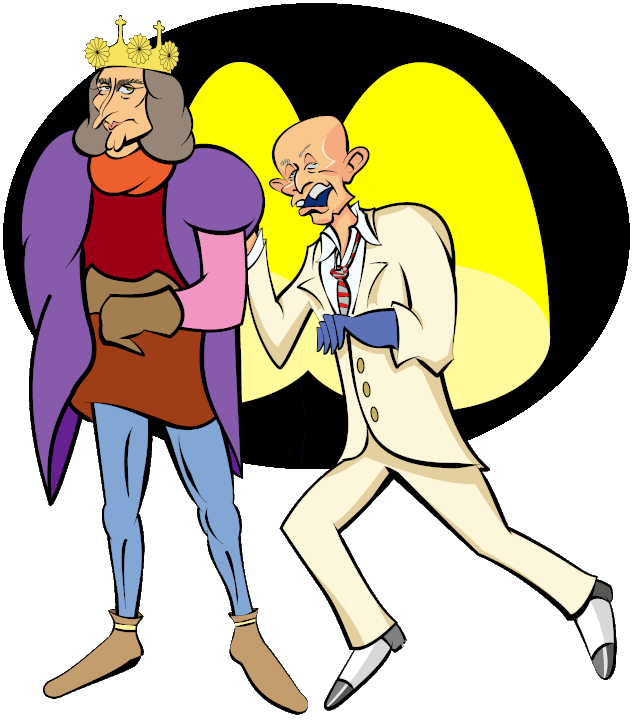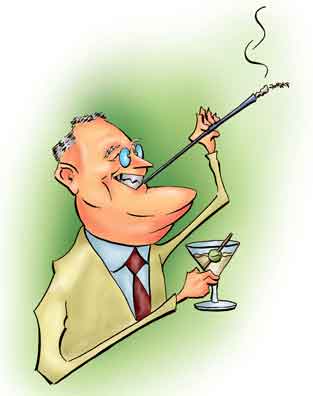Julius Caesar
(and Friends)

Of course, we all know that this group "portrait" (note quotes) really represents - left to right - Louis Calhern (Julius Caesar), Marlon Brando (Mark Antony), Greer Garson (Calpurnia), Deborah Kerr (Portia), James Mason (Brutus), and John Gielgud (Cassius). They all starred in MGM's 1953 cinematic adaptation of Shakespeare's play.
The movie was something of a shock. For one thing the public liked it, at least enough so the film made a profit. The critics also gave their approbation even though John Gielgud, who played "that spare Cassius", was the only member of the cast with a solid background in Shakespeare. True, in his early career James had appeared in a few productions of the Bard but recently had focused on making films. Louis and Deborah (whose last name is pronounced "cahr") were also well-established film actors.
There were, though, considerable doubts that Marlon, despite his acclaim from starring in A Streetcar Named Desire, would be able to adapt his "method" style of acting with its indeterminate enunciation to the stained-glass declamations required by Shakespeare. The producers needn't have worried. The movie did so well that there was even a trade paperback edition of the play that included an appendix with scenes from the screenplay with full camera directions. The appendix extolled the virtues of cinema over traditional stage productions and was written by a former Jesuit priest and later advisor to Sesame Street

Big Bill
The Bard.
Julius Caesar had been put in the can before - the film can, that is. That said, there's not all that many cinema productions. Not counting filmed stage performances, there have been only seven screen adaptations of the play including a considerably edited but actually quite good cartoon version.
The first filming was in 1950 - a 1914 Julius Caesar really isn't Shakespeare's play - and was produced in connection with the drama department of Northwestern University. Filmed at a time when a typical 90 minute film would run about $1,000,000, the cost was $60,000 and so it could honestly be called a low budget production. The producer and director, David Bradley, also filled the role of Brutus a casting decision which also helped keep costs down.

Brutus (David) and Mark (Chuck)
Daring for the 1950's.
But the film is most notable for featuring Charlton Heston just before he began his rise to leading man iconicity. Chuck took the role of Mark Antony and his costume for "the order of the course" was considerably abbreviated compared to the duds worn by Marlon and was quite daring for the mainstream 1950's.
Both the acting and cinematography is, well, we'll call it "stylized". There was some newspaper attention after the release but the showings were largely limited to specialized venues and the picture did not do well in a commercial sense. On the other hand, the MGM film with Marlon and the rest was getting publicity even before it was produced. In particular there was interest because John Gielgud was in the cast and he willingly obliged reporters who asked for interviews.
The big surprise to a lot of critics was how well Marlon spoke his lines and that he didn't sound anything like Stanley Kowalski. And yes, Marlon freely admitted he not only received but sought out coaching for the part (including advice from John). He realized his free and spontaneous acting style needed to be contained and that his American English wasn't as suited for Shakespeare as was the British English which came naturally to his co-stars James and John and Deborah and Greer.
On the other hand, it's not quite true that Marlon had never played Shakespeare. In 1944 he had a small role in a Long Island summer theater performance of Richard III. It was a low budget staging and instead of wearing tights he had to make do with a pair of long underwear presumably dyed the right color. Unlike Marlon's famous t-shirt, his longhandles weren't torn.
It was almost another 20 years before audiences got to see Julius in full color. In 1970 the film was remade and distributed by American International Pictures, a production company more famous for its movies about hot-rods, monsters, and Ma Barker than politicians in togas and sandals.
The movie boasted an all-star but rather unusual casting. Charlton Heston returned to the role of Mark Antony - at one point even more scantily clad than in the first movie. John Gielgud assumed the role of Caesar and turned the role of Cassius over to Richard Johnson who had played the professor in the first version of The Haunting. Other roles were filled by Jason Robards as Brutus, Diana Rigg as Portia, Jill Bennett as Calpurnia, Richard Chamberlain (Dr. Kildare) as Octavius Caesar, Christopher Lee (Saruman) as Artemidorus, and - even more of a surprise - Robert Vaughn as Casca. Yes, THE Robert Vaughn, Napoleon Solo, the Man from UNCLE.
Despite the prestigious cast, the movie was, to speak honestly, a flop. Critics panned it and cited Jason Robard's portrayal of Brutus as particularly worthy of trashing. For the most part the audience stayed away or more commonly weren't even aware the film existed. The make-up department was notably casual. Full beards were in evidence although this tonsorial trait had pretty much vanished during the middle Republican period (264 - 133 BC) and was rare during Caesar's time. Beards didn't really return to Rome amongst the uppercrust until around 100 AD. In the movie both Cassius and Casca sported substantial facial follicles although Mark Antony did not. But given Chuck's make-up job perhaps he should have.1
Footnote
Coin portraits do show us that the real-life Mark did sport a beard on occasion. This was probably a reflection on his fondness for Greek culture. Beards really came back into vogue following the fashion the Hardian who was Emperor Who Built the Wall and ruled from 117 to 138.
The BBC released another version of the play in 1979 where Charles Gray - noted for playing Ernst Stavro Blofeld in Diamonds Are Forever - played Caesar. This production was a made-for-TV movie and was performed with traditional costuming. It is, as Shakespeare goes, OK.

Staging Shakespeare
Traditional and Modern.
Of course, nowadays staging Shakespeare in modern rather than traditional costumes is quite popular. And probably the best screen adaptation of Julius Caesar - or any Shakespeare play for that matter - was the Royal Shakespeare Company's production where the action was set as if Rome was a modern African country. The all-black cast kept with the text: they were still in Rome, and the characters were still Caesar (Jeffery Kissoon), Brutus (Paterson Joseph), Cassius (Cyril Nri), Mark Antony (Ray Fearon), Casca (Joseph Mydell), Portia (Adjoa Andoh), Calpurnia (Samantha Lawson), and the rest.
As is usual when the RSC performs the more serious works of the Bard, in some of the scenes they slipped in some additional humor. In the first act when Caesar is off stage and was offered the crown, Cassius and Brutus are in the hallway of a public building. Then when Casca comes by, the three men slip into the men's room so they can converse unheard. While Casca is explaining "what hath chanced today, That Caesar looks so sad", he makes active use of the facilities.
What caused the real life Julius his problems was that during his rise to power he had regularly broken Roman laws. These included by-passing the Senate in enacting legislation, acting without approval of his fellow consul, arresting Senators who spoke against him, ignoring religious rules, doing government business on holidays, disregarding the tribunes' vetoes, and dumping a bucket of dung on one of one of the speakers in the Senate. As long as he held public office, Caesar was immune from prosecution but once he returned to private life, he could be arrested and put on trial. To avoid this unfortunate outcome (in his opinion), he had to remain in office.
One way out was to be declared dictator - an actual Roman office - which would give him absolute authority - imperium in the Roman patois. The trouble was that by law the dictatorship was an emergency office and the dictator was only to hold power for six months. There were, though, ways.
Like many Roman - "quote" - laws - "unquote" - the laws about the dictator's term limits was one of custom and precedence. This was like the early Presidents of the United States who voluntarily followed the example of George Washington and limited themselves to two terms. But this was custom, not law, and starting in 1933, FDR broke the mold and decided to opt for (and get re-elected) four times. The two-term Presidential limit wasn't law until the 22nd Amendment was ratified in 1951. The Congress has of course resisted term or age limits for themselves

FDR
He broke the mold.
Fortunately for Julius there was precedence for stretching a dictator's term. In 82 BC, the Roman general Lucius Cornelius Sulla was given the dictatorship (with a little help from his army). He then proceeded to kill thousands of Romans and he held on to the dictatorship until he voluntarily retired in 80 BC - after a full two years in office.
Julius, though, had to do better. After serving as governor of Gaul, Julius was supposed to disband his army and return to Rome as a private citizen. But if he did that he would be arrested and so he had to hang on to at least one office. So keeping his army together he cast the die and crossed the Rubicon River into Italy. After defeating the official Roman army led by Gnaeus Pompeius Magnus - Pompey in Shakespeare - Julius had the Roman Senate rubber stamp a decree that would make him dictator for ten years. But upon mature reflection he decided ten years wasn't enough had himself declared dictator perpetuo, that is, dictator in perpetuity or dictator for life.
Here where Julius's usual astuteness seems to have left him. He thought that as long as his indefinite and absolute rule was couched in the guise a well-established Roman office, the senators would accept it. That he didn't realize that the senators would see a dictator perpetuo as the equivalent to a king is nothing short of amazing.
The word "king" was a red flag to the Ancient Romans. They thought that one man having absolute power indefinitely was the worst government possible. Their ideal government was one where 1) power was shared and 2) there was limited tenure of office.
No one wanted to be thought of bringing back a monarchy. That was why Julius - in the play and in real life - had Mark Antony publicly offer him a crown. Not so he could accept it, but so he could refuse it. The crowd cheered, not because they wanted Julius to take the crown, but because he had rejected it. But in the end the stagecraft did no good.
Ancient Roman authors give details of Caesar's assassination and Shakespeare follows the sources about as well as any fiction writer would. The Roman historian Suetonius even says there was a soothsayer who warned Caesar that danger would come to him no later than the Ides of March. We even have the soothsayer's name, Spurinna.
And when Julius saw Brutus was one of the conspirators, he didn't say "Et tu, Brute?" Instead Suetonius says Julius spoke in Greek, "καὶ σὺ τέκνον?" (pronounced kah-ee soo TEK-non) which means, "And you, child?"
But it's a good thing we remember Shakespeare's words. After all, it's a lot easier to make jokes about "Et tu, Brute?" than "καὶ σὺ τέκνον?"
| Brutus: | "Did you get your pizza slices, Julius?" |
| Julius: | "Et two, Brute." |
... or ...
| Julius: | "Kahee soo teknon?" |
| Brutus: | "Gesundheit!" |
Just not the same.
References and Further Reading
Julius Caesar (The Complete Text with Notes; A Case Study of Julius Caesar as a Play and as a Film by the Reverend John M. Culkin, S.J.; And Selections from the Screen play, by John Dunning, A.C.E.), William Shakespeare, Scholastic Book Services, 1963.
"Hollywood Notes", Bob Thomas, Key West Citizen, Vol. LXVIII, No. 286, September 1, 1952, p. 10.
"Hollywood Notes", Bob Thomas, Key West Citizen, Vol. LXXIII, No. 210, September 3, 1952, p. 2.
"Hollywood Notes", Bob Thomas, Key West Citizen, LXXIII, No. 212, September 5, 1952, p. 10.
"Hollywood Notes", Bob Thomas, Key West Citizen, LXXIII, Vol. 286, December 1, 1952, p. 2.
"It's Sad News for Mimics:", Bob Thomas, [Washington, D. C.] Evening Star, Vol. 325, November 20, 1952, p. A-30.
"Charlton Heston: Things You Don't Remember About The Legend", Kirstie Bingham, Grunge, July 7, 2021.
"Early Film Classics Film Pair Is Offered at Dupont - Bulletin Board", Jay Carmody, [Washington, D. C.] Evening Star, Vol. 325, September 3, 1952, p. 2.
"Julius Caesar - William Shakespeare, Movie Adaptations", Spark Notes.
"Caesar's Alleged Fear of Prosecution and His 'Ratio Absentis' in the Approach to the Civil War", Robert Morstein-Marx, Zeitschrift für Alte Geschichte, Vol.56, No. 2 (2007), pp. 159-178.
Julius Caesar, Marlon Brando (actor), James Mason (actor), John Gielgud (actor), Louis Calhern (actor), Greer Garson (actor), Deborah Kerr (actor), John Doucette (actor), Joseph Mankiewicz (director, screenplay), William Shakespeare (play), Metro-Goldwyn-Mayer, 1953.
Julius Caesar, Jeffery Kissoon (actor), Paterson Joseph (actor), Cyril Nri (actor), Ray Fearon (actor), Joseph Mydell (actor), Adjoa Andoh (actor), Samantha Lawson (actor), Gregory Doran (director), William Shakespeare (script, play), Royal Shakespeare Company, 2012.
Julius Caesar, William Shakespeare, Joss Ackland (voice actor), Paterson Joseph (voice actor), David Robb (voice actor), Hugh Quarshie (voice actor), Jim Carter (voice actor), Peter Woodthorpe (voice actor), Judith Sharp (voice actor), Frances Tomelty (voice actor), Dillwyn Owen (voice actor), Yuri Kulakov (director), Shakespeare: The Animated Tales, 1992 - 1994.